Uncover the allure of Husky dogs in this Article. From their captivating history to care essentials, we navigate the unique world of Huskies, offering valuable tips for prospective owners and enthusiasts alike. Join us for a brief exploration into the Arctic spirit embodied by these energetic and striking canines.
Husky Dog
Meet the enchanting Husky dog, a breed that captivates hearts with its striking appearance and charismatic personality. In this comprehensive guide, we’ll delve into the unique traits, history, care tips, and more that make Huskies one of the most fascinating canine companions.
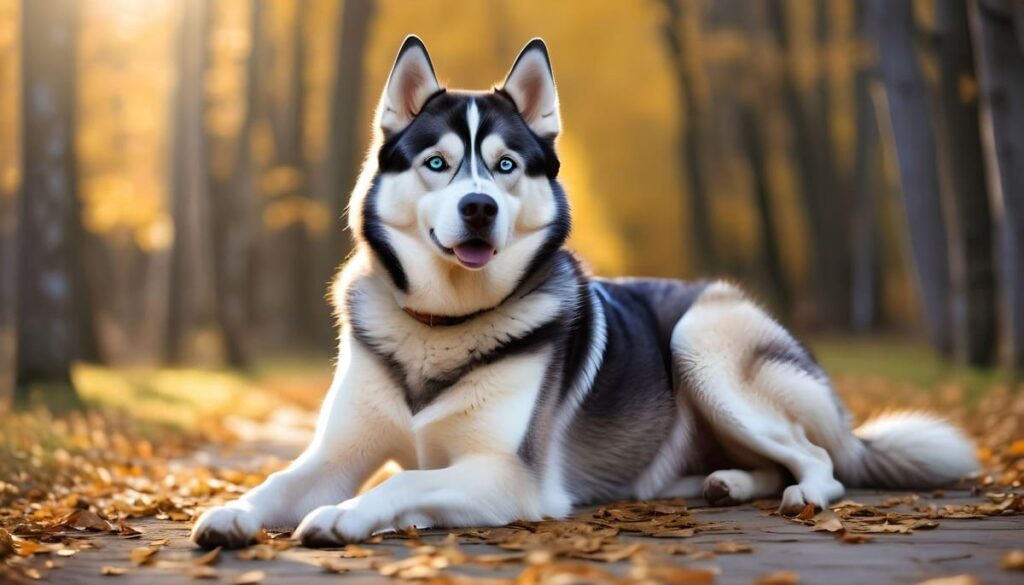
The Allure of the Husky:
The Siberian Husky, known for its striking blue eyes, thick double coat, and distinctive markings, is a breed that originated in Siberia. Bred by the Chukchi people for sledding in harsh Arctic conditions, these dogs are not only beautiful but also possess remarkable endurance and strength.
Physical Characteristics:
Huskies are medium-sized dogs with a well-balanced build. Their erect triangular ears, bushy tails, and thick fur contribute to their majestic appearance. Understanding their physical characteristics is crucial for appreciating the breed and providing appropriate care.
Temperament and Intelligence:
Huskies are renowned for their friendly and outgoing nature. Their intelligence and independent spirit make them both delightful and challenging companions. Discover the traits that set Huskies apart and learn how to channel their energy positively.
Husky Care Essentials:
Caring for a Husky requires attention to their specific needs. From grooming their thick coat to ensuring they get enough exercise, this section provides actionable tips to keep your Husky healthy, happy, and thriving.
Grooming:
Learn the ins and outs of Husky grooming, including tips for brushing, bathing, and managing shedding. Proper grooming not only enhances their appearance but also contributes to their overall well-being.
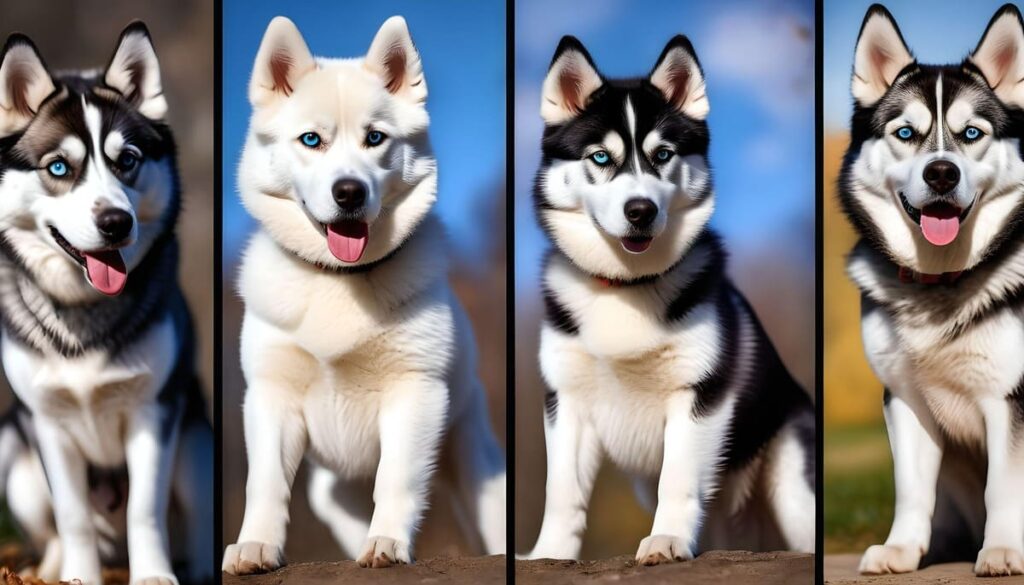
Exercise Requirements:
Huskies are energetic and require regular exercise to stay content. Discover engaging activities and exercise routines that cater to their natural instincts, preventing boredom and potential behavior issues.
Training Huskies Effectively:
Huskies are intelligent but can be strong-willed. Discover positive reinforcement techniques and effective training methods to ensure a well-behaved and obedient companion. From basic commands to addressing specific behavioral challenges, we’ve got you covered.
Husky Dog Puppies
Husky dog puppies are the epitome of cuteness, with their fluffy fur, bright eyes, and playful demeanor. Born into the world with distinct markings and a sense of curiosity, these little bundles of joy quickly capture the hearts of dog lovers. As they grow, their striking physical features and inherent Husky traits begin to shine, making them not just adorable but also fascinating companions. Whether you’re a seasoned dog owner or a first-timer, the experience of raising and bonding with a Husky puppy is sure to be a rewarding journey filled with joy and companionship.
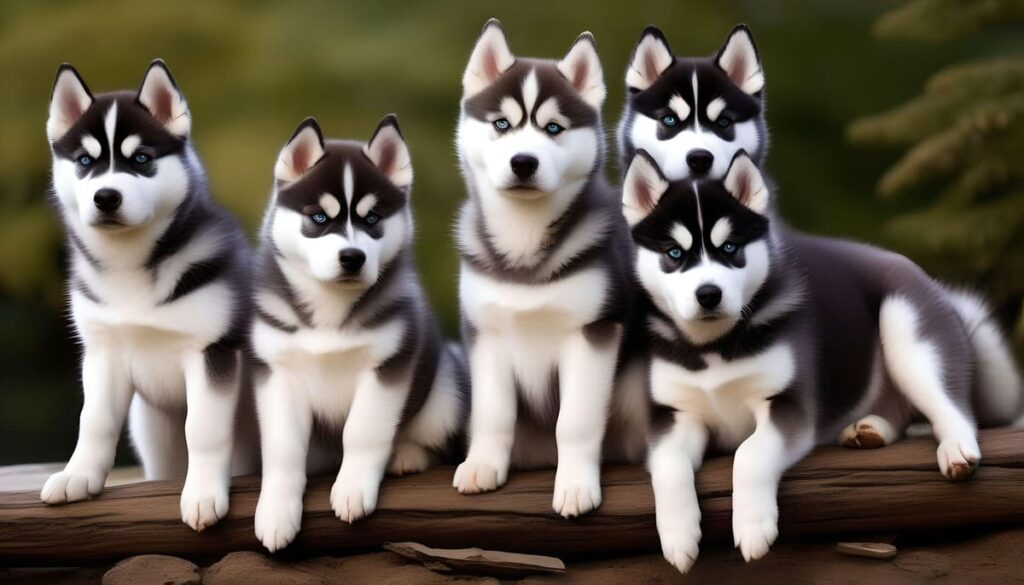
Characteristics of Husky Dogs
Here are some common Characteristics and overview of Husky Dogs:
| Characteristics of Husky Dogs | |
|---|---|
| 1. Size: | Medium to large, with males typically larger than females. |
| 2. Weight: | Adult Huskies weigh between 35 to 60pounds, with males being heavier. |
| 3. Coat: | Double coat with a dense, softundercoat and a straight, coarse outercoat. |
| 4. Color: | Various coat colors, including black,gray, red, and agouti. Distinctive facial masks and markings. |
| 5. Eyes: | Typically almond-shaped, and may comein blue, brown, or heterochromia (two different-colored eyes). |
| 6. Ears: | Erect triangular ears that contribute to their alert and expressive look. |
| 7. Tail: | Carried over the back in a sickle curve when alert; straight when relaxed. |
| 8. Temperament: | Friendly, outgoing, and social. Can be independent and stubborn. |
| 9. Intelligence: | Highly intelligent and trainable. May have a stubborn streak, requiring consistent positive reinforcement. |
| 10. Energy Levels: | Extremely high energy levels, requiring regular exercise and mental stimulation. |
| 11. Howling Vocalization: | Known for howling instead of barking. Uses vocalizations to communicate needs and emotions. |
| 12. Adaptability: | Cold-weather adaptation with a thick double coat. May struggle in hot climates. |
| 13. Sociability: | Generally sociable with people and other dogs. Strong pack mentality. |
| 14. Exercise Needs: | High exercise requirements, including daily walks, runs, and playtime. |
| 15. Escape Tendencies: | Known as escape artists; secure fencing is essential. |
Types of Husky Dogs
Discover the captivating world of Husky dogs as we delve into various types that showcase a spectrum of colors and markings. From the iconic Siberian Husky to the unique Red and Agouti variations, each type brings its own charm. Let’s explore the distinct characteristics of different Husky types, helping you choose the perfect companion for your lifestyle.
1. Siberian Husky: The Quintessential Arctic Companion
The Siberian Husky, renowned for its striking features and blue or multi-colored eyes, is the epitome of Arctic beauty. With a friendly nature and exceptional endurance, these dogs have become synonymous with the Husky breed.
2. Alaskan Husky: Versatility in the Arctic Workforce
While not a distinct breed, the Alaskan Husky is a specially bred type, excelling in sledding and Arctic work. Varied in appearance, Alaskan Huskies share the Siberian’s endurance, making them invaluable in challenging climates.
3. Malamute Husky: Power and Size
Distinct from Siberian Huskies, Alaskan Malamutes are a separate breed bred for heavy freight pulling. Larger and more robust, Malamutes boast strength and resilience in demanding conditions.
4. Red Husky: A Splash of Vibrant Elegance
Featuring a stunning reddish coat, Red Huskies add a pop of color to the traditional Husky palette. Ranging from light copper to deep mahogany, their unique hue sets them apart in appearance.
5. Agouti Husky: The Wild Wolf Aesthetic
Known for their wolf-like appearance, Agouti Huskies exhibit a coat pattern resulting in banded hairs of different colors. This creates a distinctive and wild aesthetic reminiscent of their northern heritage.
6. Black and White Husky: Timeless Contrast
Classic and timeless, Black and White Huskies boast a predominantly black coat with striking white facial markings, paws, and underbelly, emphasizing the breed’s iconic features.
7. Gray Husky: Shades of Elegance
Gray Huskies come in various shades, from light silver to dark charcoal. Their gray coat accentuates facial masks and markings, presenting an elegant and sophisticated appearance.
8. Piebald Husky: Mosaic Beauty
Featuring a predominantly white coat with colorful patches, Piebald Huskies showcase a mosaic-like effect. The unique pattern adds a touch of individuality to their appearance.
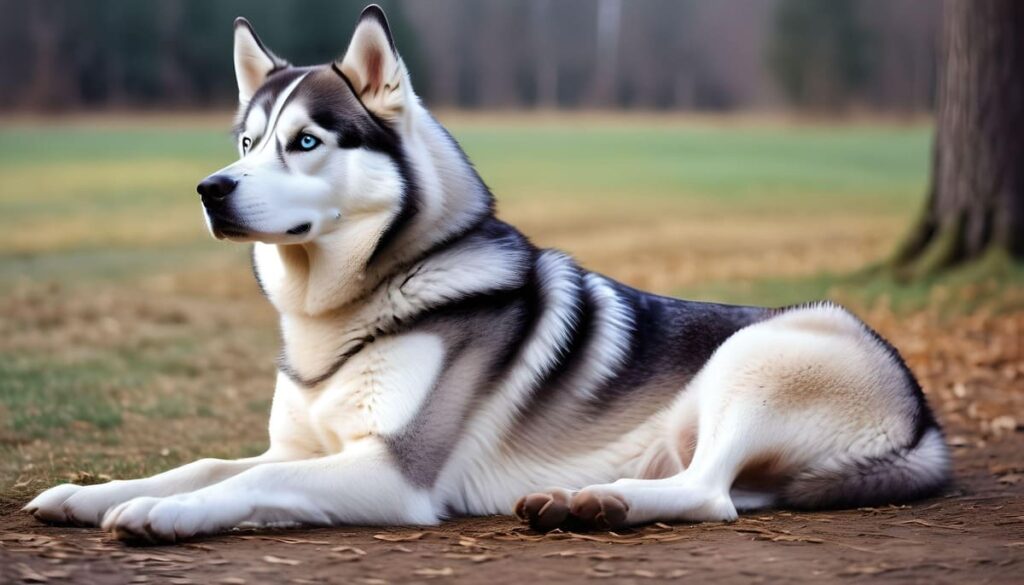
History of Husky Dog
The history of Husky dogs is deeply intertwined with the Chukchi people of Siberia, who selectively bred them for endurance in sled pulling. This unique heritage made them invaluable during the Alaskan Gold Rush, showcasing their resilience and adaptability in harsh conditions. Today, the Husky’s history stands as a testament to their enduring spirit and remarkable working capabilities.
Appearance of Husky Dogs
Husky dogs exhibit a captivating appearance characterized by erect triangular ears, a dense double coat, and mesmerizing eyes that can be blue, brown, or multi-colored. Their medium-sized, well-balanced bodies showcase strength and agility, complemented by distinctive facial markings. Whether in classic black and white, elegant gray, or vibrant red variations, the Husky’s appearance is a harmonious blend of beauty and functionality.
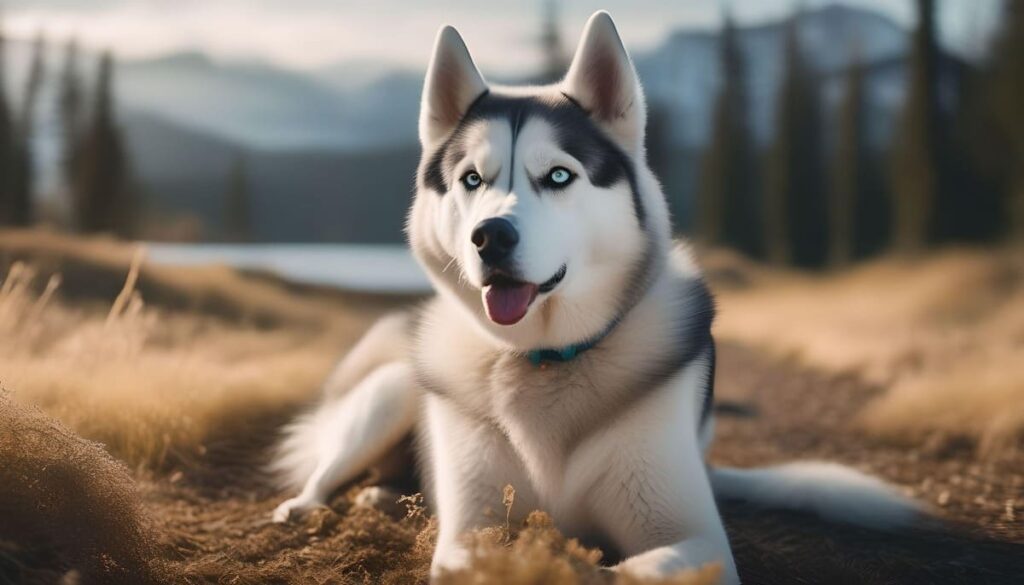
Temperament of Husky Dog
Known for their friendly and outgoing nature, Husky dogs possess a temperament marked by intelligence and independence. Their strong pack mentality fosters loyalty and a sense of teamwork. While their affectionate side shines through, a hint of stubbornness may surface, emphasizing the need for consistent training. With an energetic and playful disposition, Huskies make excellent family pets when provided with the right care and attention.
Behaviour of Husky Dog
Understanding the behavior of Husky dogs is essential for building a positive relationship. Their high energy levels necessitate regular exercise, and their vocal tendencies, including howling, serve as a unique form of communication. Early socialization is crucial to ensure they get along well with other pets and people. Through proper training and care, the behavior of Husky dogs reveals an endearing and well-mannered demeanor, making them cherished companions.
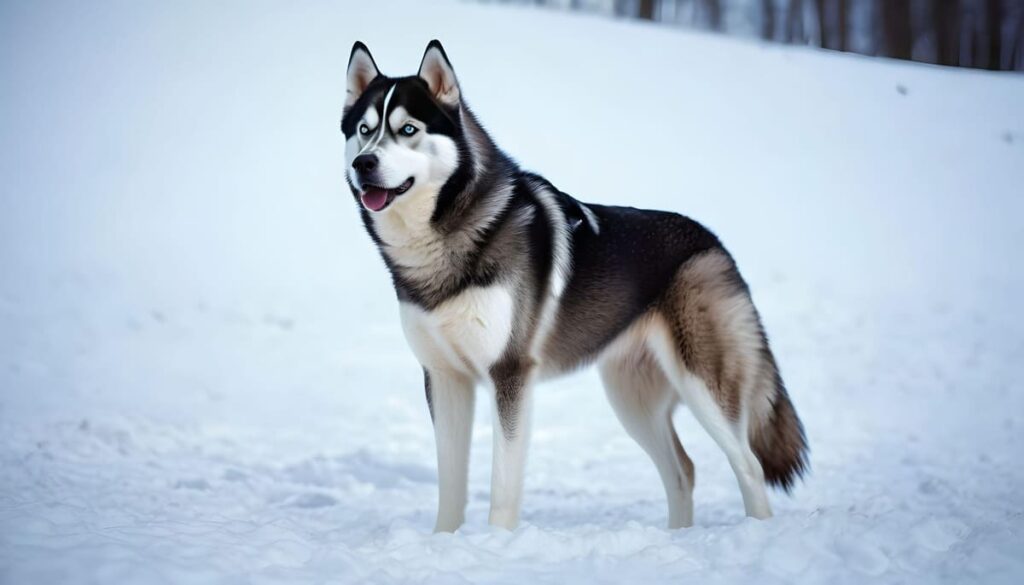
Husky Price
Husky prices in India and the USA vary based on factors such as lineage, breeder reputation, and location. In India, the cost of a Husky puppy can range from ₹40,000 to ₹1,00,000, with variations due to factors like coat color and breeder standards. In the USA, the average price for a Husky puppy typically falls between $600 and $1,300, although premium breeders may charge more for puppies with desirable traits.
Husky Price in the USA
In the USA, the cost of Husky puppies fluctuates based on factors like breeder reputation, lineage, and desirable traits. On average, the price typically falls between $600 and $1,300. However, premium breeders may charge more for Huskies with specific markings or exceptional bloodlines. It’s crucial for potential buyers to thoroughly vet breeders to guarantee the well-being and quality of the puppy.
Husky Price in the UK
Husky prices in the UK also vary, depending on factors such as breeder credibility, pedigree, and coat color. On average, the cost of a Husky puppy in the UK ranges from £600 to £1,200. Reputable breeders may charge higher prices for puppies with exceptional lineage or unique characteristics. Prospective owners should prioritize ethical breeders to ensure the health and proper upbringing of their new furry companion.
Husky Price in Australia
In Australia, the price of Husky puppies is influenced by breeder reputation, lineage, and demand. On average, the cost of a Husky puppy in Australia ranges from AUD 800 to AUD 2,000. Premium breeders may charge higher prices for puppies with distinct markings or superior bloodlines. It’s essential for potential buyers to conduct thorough research and choose responsible breeders to ensure the well-being of their new pet.
Husky Price In India
The price of Husky puppies in India varies, with factors such as lineage, breeder reputation, and coat color influencing the cost. On average, a Husky puppy in India can range from ₹40,000 to ₹1,00,000. Premium breeders or those with sought-after bloodlines may charge higher prices. Prospective buyers should carefully research and choose reputable breeders to ensure the health and quality of the puppy.
Siberian Husky Price In India
The price of Siberian Huskies in India varies based on factors like lineage, breeder reputation, and coat color. On average, Siberian Husky puppies in India can range from ₹40,000 to ₹1,00,000. It’s essential for potential buyers to research reputable breeders to ensure the health and quality of the puppy.
Indian Husky Dog Price
The price of Husky dogs in India is influenced by factors like breeder reputation, pedigree, and demand. On average, the cost of a Husky dog in India ranges from ₹40,000 to ₹1,00,000. Prospective owners should conduct thorough research and choose ethical breeders to ensure the well-being of their new pet.
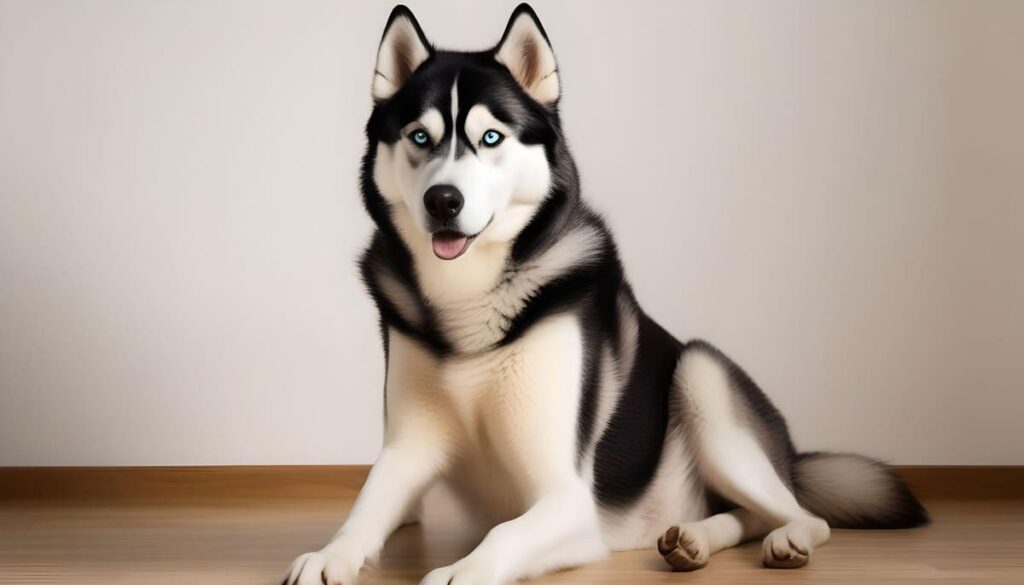
Himalayan Husky Dog Price In India
The Himalayan variation of the Husky may have a slightly different price range in India, depending on factors like breeder credibility and coat color. On average, the cost of a Himalayan Husky dog in India can range from ₹45,000 to ₹1,10,000. Buyers should verify the breed’s authenticity and gather information on the breeder’s reputation.
Siberian Husky Price In India Olx
The price of Siberian Huskies on OLX in India varies based on sellers and location. Prices may range from ₹30,000 to ₹80,000 or more. However, caution is advised, and buyers should ensure the legitimacy of the transaction and the health of the puppy when purchasing through online platforms like OLX.
White Husky Price In India
White Huskies, known for their striking appearance, may have a specific price range in India. On average, the cost of a White Husky in India can range from ₹45,000 to ₹1,00,000. Buyers should inquire about the puppy’s health, lineage, and breeder reputation when considering a White Husky.
Pomeranian Husky Price In India
Pomeranian Huskies, a mix of Pomeranians and Huskies, may have a distinct price range in India. On average, the cost of a Pomeranian Husky in India can range from ₹30,000 to ₹80,000. Buyers should be aware of the characteristics of this mixed breed and choose reputable breeders.
Alaskan Husky Price In India
While not a distinct breed, Alaskan Huskies bred for sledding purposes may have a different price range in India. On average, the cost of an Alaskan Husky in India can range from ₹40,000 to ₹1,00,000. Buyers should ensure they are obtaining the right type of Husky for their needs and preferences.
Husky Puppy Price In India
The general price range for Husky puppies in India is influenced by factors such as lineage, breeder reputation, and coat color. On average, the cost of a Husky puppy in India can range from ₹30,000 to ₹90,000. Prospective owners should prioritize ethical breeders to ensure the health and proper upbringing of their new furry companion.
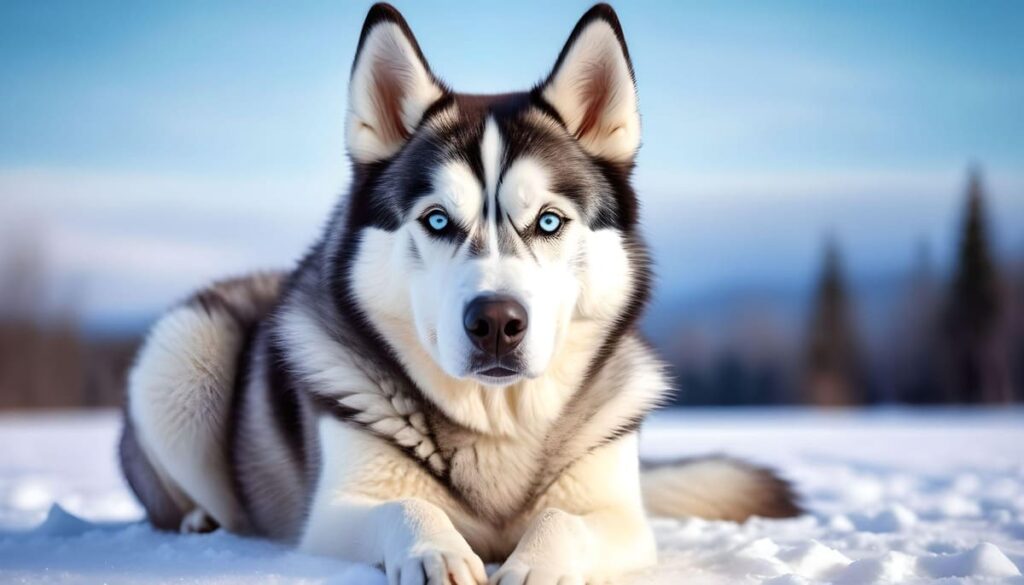
Siberian Husky Blue Eyes Price In India
The enchanting Siberian Husky with blue eyes may have a specific price range in India. On average, the cost of a Husky with blue eyes can range from ₹50,000 to ₹1,20,000. Buyers should inquire about the health, genetics, and breeder reputation when considering a Siberian Husky with captivating blue eyes.
Husky Male Puppy Price In India
The cost of a male Husky puppy in India depends on factors such as breeder reputation, pedigree, and characteristics. On average, the price can range from ₹40,000 to ₹1,00,000. Buyers should carefully choose responsible breeders to guarantee the well-being and proper upbringing of the male Husky puppy.
1 Month Baby Siberian Husky Price In India
The price of a 1-month-old Siberian Husky puppy in India may be influenced by factors like age, health, and breeder reputation. On average, the cost can range from ₹35,000 to ₹80,000. Buyers should ensure the puppy’s well-being and inquire about its upbringing and health during the crucial early weeks.
Husky Dog Prices In Major Indian Cities
Here are Husky Dog Prices In Major Indian Cities:
| City | Average Husky Dog Price Range (INR) |
|---|---|
| Delhi | ₹40,000 – ₹1,00,000 |
| Mumbai | ₹45,000 – ₹1,10,000 |
| Bangalore | ₹40,000 – ₹1,00,000 |
| Kolkata | ₹35,000 – ₹90,000 |
| Chennai | ₹40,000 – ₹1,00,000 |
| Hyderabad | ₹40,000 – ₹1,00,000 |
| Pune | ₹45,000 – ₹1,10,000 |
| Ahmedabad | ₹35,000 – ₹90,000 |
| Jaipur | ₹40,000 – ₹1,00,000 |
| Chandigarh | ₹45,000 – ₹1,10,000 |
Husky Dog Price in Bangalore
In Bangalore, the average price range for Husky dogs is approximately ₹50,000 to ₹1,20,000. Prices may vary based on factors such as breeder reputation, lineage, and coat color. Prospective buyers are advised to research reputable breeders to ensure the health and quality of the Husky puppy.
Husky Dog Price in Kerala
The cost of a Husky dog in Kerala typically falls within the range of ₹45,000 to ₹1,10,000. Pricing variations are influenced by factors such as breeder reputation, lineage, and specific traits. It is essential for potential buyers to choose reputable breeders who prioritize the well-being and proper upbringing of their Husky puppies.
Husky Dog Price in Chennai
In Chennai, the average price range for Husky dogs is approximately ₹50,000 to ₹1,20,000. The pricing is influenced by factors such as breeder credibility, lineage, and coat color. Prospective owners should conduct thorough research and select responsible breeders for a healthy and well-adjusted addition to their family.
Husky Dog Price in Jaipur
The average price range for a Husky dog in Jaipur is ₹45,000 to ₹1,10,000. Prices can vary based on factors such as breeder reputation, lineage, and the specific characteristics of the dog. Buyers should prioritize ethical breeders to ensure the health and overall quality of their chosen Husky puppy.
Husky Dog Price in Ludhiana
In Ludhiana, the cost of a Husky dog typically ranges from ₹55,000 to ₹1,30,000. The price is influenced by factors such as breeder reputation, lineage, and the unique traits of the dog. Prospective buyers should carefully choose reputable breeders to ensure the health and well-being of their Husky puppies.
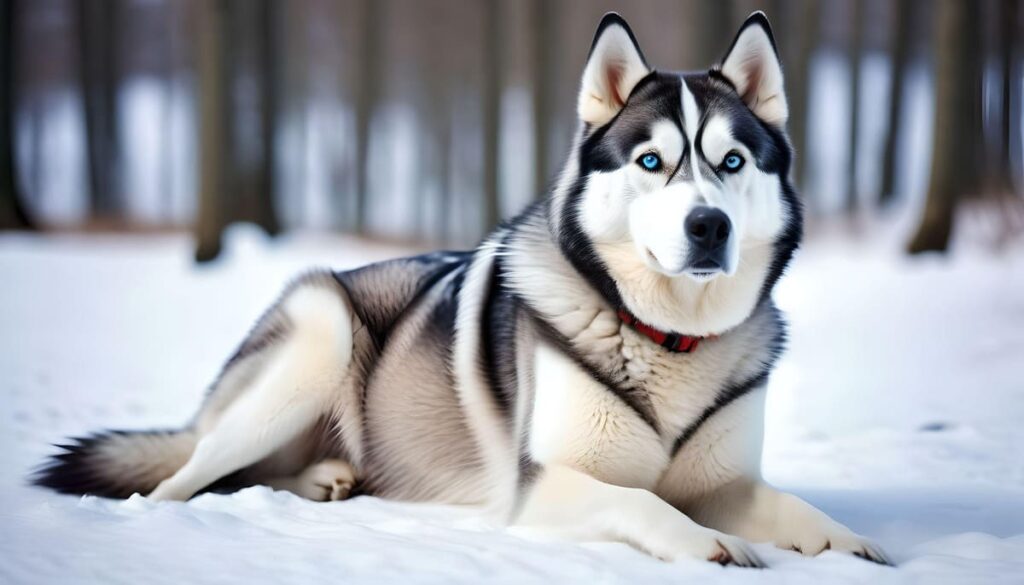
Husky Dog Price in Ahmedabad
The average price range for a Husky dog in Ahmedabad is ₹40,000 to ₹95,000. Pricing variations are influenced by factors such as breeder reputation, lineage, and coat color. Prospective owners are advised to conduct thorough research to select responsible breeders for a healthy and happy addition to their family.
Husky Dog Price in Indore
In Indore, the cost of a Husky dog typically ranges from ₹42,000 to ₹1,00,000. This price range is influenced by factors such as breeder reputation, lineage, and coat color. It is crucial for potential buyers to choose ethical breeders to ensure the well-being and proper upbringing of their Husky puppies.
Husky Dog Price in Punjab
The average price range for a Husky dog in Punjab is ₹50,000 to ₹1,20,000. Prices can vary based on factors such as breeder reputation, lineage, and coat color. Prospective buyers should prioritize ethical breeders to guarantee a healthy and well-adjusted addition to their family.
Husky Dog Price in Tamil Nadu
In Tamil Nadu, the pricing for Husky dogs generally falls within the range of ₹48,000 to ₹1,15,000. This range is influenced by factors such as breeder credibility, lineage, and coat color. It is essential for potential buyers to research and choose responsible breeders for a healthy and happy addition to their family.
Husky Dog Price in Chandigarh
In Chandigarh, the average price range for Husky dogs is ₹60,000 to ₹1,35,000. Pricing variations are influenced by factors such as breeder reputation, lineage, and specific traits. Prospective owners are advised to conduct thorough research and select reputable breeders for a healthy and happy addition to their family.
Husky Dog Price in Bhopal
The cost of a Husky dog in Bhopal typically ranges from ₹45,000 to ₹1,10,000. Prices can vary based on factors such as breeder reputation, lineage, and coat color. Buyers should prioritize ethical breeders to ensure the health and well-being of their Husky puppies.
Husky Dog Price in Jammu
In Jammu, the average price range for Husky dogs is ₹52,000 to ₹1,25,000. This range can vary based on factors such as breeder reputation, lineage, and coat color. Prospective buyers should prioritize ethical breeders to ensure a healthy and well-adjusted addition to their family.
Husky Dog Price in Kolkata
The pricing for Husky dogs in Kolkata generally falls within the range of ₹48,000 to ₹1,15,000. Prices can vary based on factors such as breeder credibility, lineage, and coat color. It is crucial for potential buyers to research and choose responsible breeders for a healthy and happy addition to their family.
Husky Dog Price in Nagpur
In Nagpur, the cost of a Husky dog typically ranges from ₹50,000 to ₹1,20,000. Pricing variations are influenced by factors such as breeder reputation, lineage, and specific traits. Buyers should prioritize ethical breeders to ensure the health and well-being of their Husky puppies.
Husky Dog Price in Hyderabad
The average price range for Husky dogs in Hyderabad is ₹55,000 to ₹1,30,000. This range is subject to variations based on factors such as breeder reputation, lineage, and coat color. Prospective owners should prioritize ethical breeders to guarantee a healthy and well-adjusted addition to their family.
Husky Dog Price in Jalandhar
In Jalandhar, the average price range for Husky dogs is ₹48,000 to ₹1,15,000. Prices can vary based on factors such as breeder reputation, lineage, and coat color. Prospective owners are advised to conduct thorough research and select reputable breeders for a healthy and happy addition to their family.
Husky Dog Price in Siliguri
The pricing for Husky dogs in Siliguri generally falls within the range of ₹55,000 to ₹1,30,000. This range is influenced by factors such as breeder credibility, lineage, and coat color. It is crucial for potential buyers to research and choose responsible breeders for a healthy and happy addition to their family.
Husky Dog Price in Karnataka
In Karnataka, the average price range for Husky dogs is ₹50,000 to ₹1,20,000. This range is subject to variations based on factors such as breeder reputation, lineage, and specific traits. Buyers should prioritize ethical breeders to ensure the health and well-being of their Husky puppies.
Husky Dog Price in Coimbatore
The cost of a Husky dog in Coimbatore typically ranges from ₹48,000 to ₹1,15,000. Pricing variations are influenced by factors such as breeder reputation, lineage, and coat color. It is crucial for potential buyers to choose ethical breeders to ensure the well-being and proper upbringing of their Husky puppies.
Husky Dog Price in Lucknow
In Lucknow, the average price range for Husky dogs is ₹52,000 to ₹1,25,000. This range is subject to variations based on factors such as breeder reputation, lineage, and coat color. Prospective owners should prioritize ethical breeders to guarantee a healthy and well-adjusted addition to their family.
Husky Dog Price in Haryana
The pricing for Husky dogs in Haryana generally falls within the range of ₹45,000 to ₹1,10,000. This range is influenced by factors such as breeder credibility, lineage, and coat color. It is essential for potential buyers to research and choose responsible breeders for a healthy and happy addition to their family.
Husky Dog Price in Pune
In Pune, the average price range for Husky dogs is ₹60,000 to ₹1,35,000. Pricing variations are influenced by factors such as breeder reputation, lineage, and specific traits. Prospective owners are advised to conduct thorough research and select reputable breeders for a healthy and happy addition to their family.
Husky Dog Price in Vijayawada
The cost of a Husky dog in Vijayawada typically ranges from ₹48,000 to ₹1,15,000. This price range is influenced by factors such as breeder reputation, lineage, and coat color. Buyers should prioritize ethical breeders to ensure the health and well-being of their Husky puppies.
Husky Dog Price in Assam
In Assam, the average price range for Husky dogs is ₹50,000 to ₹1,20,000. This range is subject to variations based on factors such as breeder reputation, lineage, and specific traits. Prospective owners should prioritize ethical breeders to guarantee a healthy and well-adjusted addition to their family.
Husky Dog Price in Ranchi
The pricing for Husky dogs in Ranchi generally falls within the range of ₹50,000 to ₹1,20,000. This range is influenced by factors such as breeder credibility, lineage, and coat color. It is essential for potential buyers to research and choose responsible breeders for a healthy and happy addition to their family.
Husky Dog Price in Shillong
In Shillong, the average price range for Husky dogs is ₹50,000 to ₹1,20,000. This range is subject to variations based on factors such as breeder reputation, lineage, and specific traits. Buyers should prioritize ethical breeders to ensure the health and well-being of their Husky puppies.
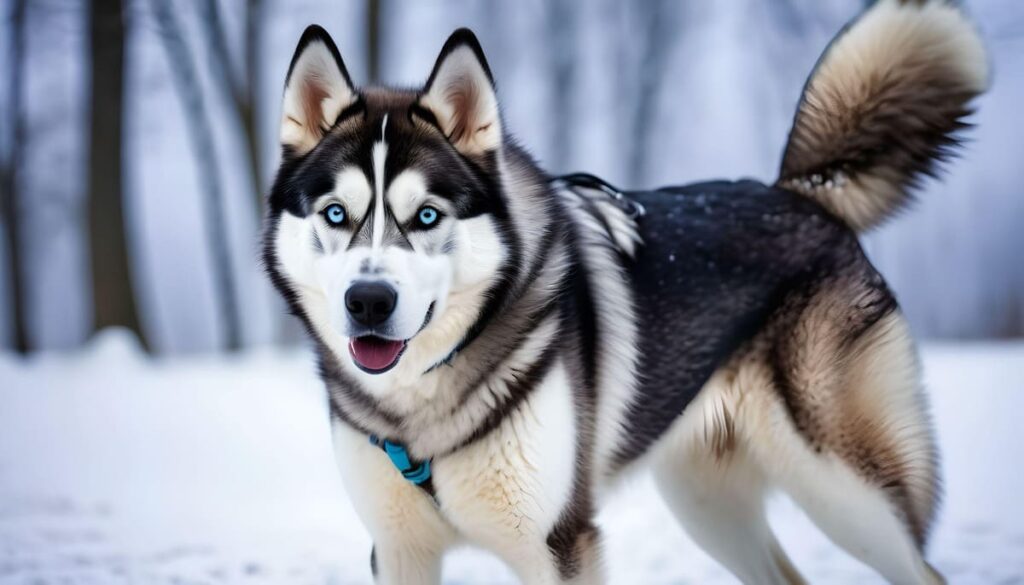
Husky Price in India Delhi
In Delhi, the cost of a Husky dog typically ranges from ₹55,000 to ₹1,30,000. This range is influenced by factors such as breeder reputation, lineage, and coat color. Prospective owners should prioritize ethical breeders to guarantee a healthy and well-adjusted addition to their family.
Factors that Affect the Price of Husky Dog
When considering the price of a Husky dog, various factors come into play. These factors can significantly influence the overall cost and are essential for prospective owners to be aware of. Here are some key factors:
- Breed Quality and Lineage: The quality and lineage of the Husky play a crucial role in determining its price. Dogs with strong pedigrees, good health records, and desirable traits may command higher prices.
- Coat Color and Markings: The coat color and markings of a Husky can affect its price. Certain colors and unique markings may be more sought after, leading to higher prices for dogs with these characteristics.
- Breeder Reputation: Reputable breeders with a history of producing healthy and well-socialized Huskies may charge higher prices. Choosing a trustworthy breeder ensures the dog’s overall health and temperament.
- Geographic Location: The cost of Husky dogs can vary based on geographic location. Prices may be higher in urban areas or regions with higher demand for specific breeds.
- Age of the Dog: The age of the Husky can influence its price. Puppies are often more expensive than adult dogs, and trained or socialized dogs may also have higher price tags.
- Health Screening and Vaccinations: Dogs that undergo health screening, vaccinations, and other preventive measures may have higher initial costs. However, these dogs often come with the assurance of good health.
- Breeder Expenses: The expenses incurred by the breeder, including veterinary care, food, and other necessities, may be reflected in the price of the Husky.
- Demand and Availability: High demand for Husky dogs or limited availability of certain colors or traits can lead to higher prices. Conversely, lower demand may result in more competitive pricing.
- Training and Socialization: Dogs that have undergone training and socialization may be priced higher due to the time and effort invested in preparing them for family life.
- Inclusions in the Sale: Some breeders include additional services or items in the sale, such as a starter kit, vaccinations, microchipping, or initial grooming. These can contribute to the overall cost.
Monthly Maintenance Cost of Husky Dogs:
In addition to the initial purchase price, prospective Husky owners should consider the ongoing monthly maintenance costs. These may include:
- Food and Treats: High-quality dog food suitable for the specific needs of Huskies.
- Grooming Supplies: Brushes, combs, and grooming tools for their double coat.
- Veterinary Care: Regular check-ups, vaccinations, and preventive medications.
- Training Classes: Optional, but beneficial for socialization and obedience training.
- Toys and Enrichment: Huskies are energetic and benefit from toys and activities to keep them mentally stimulated.
- Pet Insurance: Consideration of pet insurance for unexpected medical expenses.
- License and Identification: Licensing fees and identification tags for compliance with local regulations.
Availability of Husky Dogs in India:
While Husky dogs are available in India, their availability may vary across different regions. Reputable breeders, rescue organizations, and pet stores may offer Huskies for sale or adoption. It’s essential to conduct thorough research, connect with reliable breeders, and inquire about availability. Due diligence in understanding the source and ensuring ethical practices is crucial when obtaining a Husky in India.
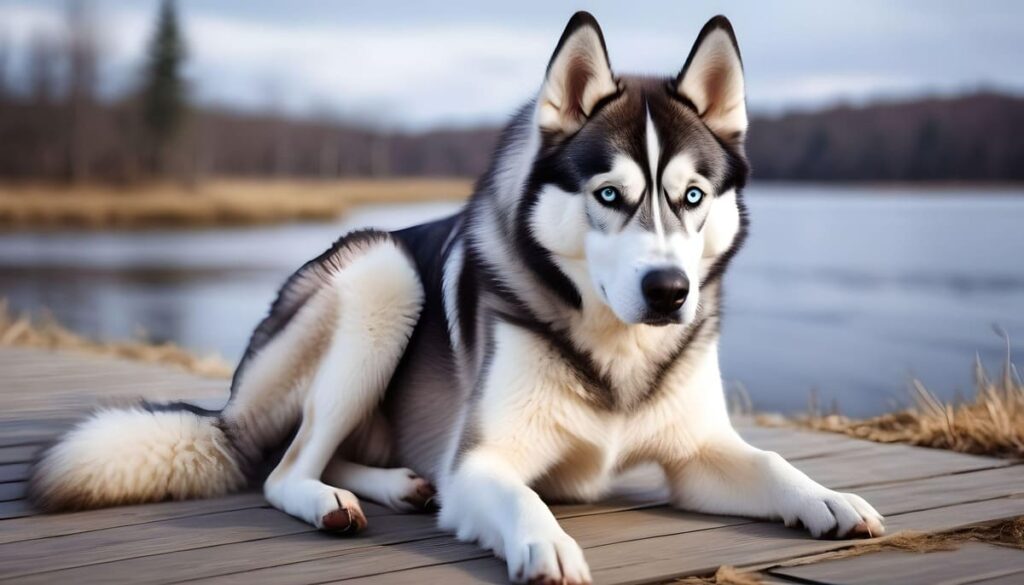
Husky Dog price comparison:
The price of Husky dogs can vary based on factors such as breeder reputation, lineage, and geographic location. It’s advisable to compare prices from different breeders, taking into account the quality of care provided, health guarantees, and any additional services included in the purchase. However, potential buyers should prioritize the well-being and ethical treatment of the dogs over price alone.
How to negotiate the price of Husky Dog:
Negotiating the price of a Husky dog requires a balanced approach. Here are some tips:
- Research:
- Be well-informed about the average Husky prices in your region. Research breeders and their reputation.
- Build a Relationship:
- Establish a good rapport with the breeder. Show genuine interest in the well-being of the dog.
- Ask Questions:
- Inquire about the breeding practices, health checks, and the dog’s history. This can provide insights into the dog’s quality.
- Bundle Services:
- Some breeders may offer additional services. Negotiate or inquire about including services like vaccinations or a starter kit in the overall cost.
- Be Respectful:
- Approach negotiations with respect. Breeders invest time and effort into raising healthy dogs.
- Consideration of Breed Standard:
- If the dog meets the breed standard, it may be worth the asking price. Quality breeding and care contribute to the overall cost.
- Timing:
- Be mindful of timing. Some breeders may be open to negotiation during certain periods.
- Be Open and Honest:
- Clearly communicate your budget constraints and see if the breeder is willing to work with you.
The true cost of owning a Husky Dogs:
Owning a Husky involves more than the initial purchase price. The true cost includes:
- Veterinary Expenses: Regular check-ups, vaccinations, and potential emergency medical care.
- Nutrition: High-quality dog food suitable for Husky nutritional needs.
- Grooming: Brushes, combs, and grooming tools for their double coat.
- Training Classes: Obedience training and socialization classes for a well-behaved pet.
- Toys and Enrichment: Toys and activities to keep them mentally stimulated.
- Exercise: Time and effort for daily exercise to fulfill their energetic nature.
- Pet Insurance: Consideration of pet insurance for unexpected medical expenses.
- Licensing and Identification: Compliance with local regulations, including licensing and identification.
- Time Commitment: Huskies require time and attention. Owners should be prepared for a significant time commitment for walks, play, and bonding.
Facts about Husky Dogs
Some Interesting Facts about Husky Dogs:
- Origin and History: Huskies originated from Siberia and were initially developed by the Chukchi people for sled-pulling and transportation in harsh Arctic conditions.
- Distinct Appearance: Known for their striking appearance, Huskies have a thick double coat, erect triangular ears, and distinctive facial markings.
- Energetic and Athletic: Huskies are highly energetic and athletic dogs. They were bred for endurance and can cover long distances with ease.
- Sociable Nature: Huskies are known for their friendly and sociable nature. They generally get along well with people, including children, and other dogs.
- Independent Thinkers: Huskies are intelligent and independent thinkers. While this makes them trainable, they may also exhibit a stubborn streak, requiring consistent training and positive reinforcement.
- Howling Communication: Unlike traditional barking, Huskies are known for their distinctive howling. They use various vocalizations to communicate with their owners and other dogs.
- Cold-Weather Adaptation: Their double coat serves as insulation against cold temperatures. Huskies can withstand extremely low temperatures and thrive in colder climates.
- Escape Artists: Huskies are notorious escape artists. They have a strong instinct to roam and explore, and they may dig or jump to escape enclosures if not properly secured.
- Pack Mentality: Huskies have a strong pack mentality and may display loyalty to their family. This trait makes them excellent family dogs when socialized properly.
- Sled-Pulling Heritage: Due to their sled-pulling heritage, Huskies have incredible strength and endurance. They excel in activities such as mushing and skijoring.
- Diverse Coat Colors: Huskies come in various coat colors, including black, gray, red, and agouti. Their striking facial masks and contrasting markings add to their unique appearance.
- Low Grooming Requirements: Despite their thick coat, Huskies have relatively low grooming requirements. They shed heavily during seasonal changes, a phenomenon known as “blowing coat.”
- Expressive Blue Eyes: Many Huskies have striking blue eyes, though heterochromia (having two different-colored eyes) is not uncommon. The blue eyes contribute to their captivating and expressive appearance.
- Heritage of Sledding Champions: Siberian Huskies have a rich history in sled racing and have been part of winning teams in competitions such as the Iditarod and the All-Alaska Sweepstakes.
- Affectionate Companions: Despite their independent nature, Huskies can be affectionate and enjoy being close to their human companions. They may seek attention and show loyalty to their families.
Pros and Cons of Husky Dogs
Here are some common Pros and Cons of Husky Dogs:
| Pros of Husky Dogs | Cons of Husky Dogs |
|---|---|
| 1. Energetic and Athletic:- Ideal for active individuals and families. | 1. High Energy Levels:– Require ample exercise and play to prevent boredom. |
| 2. Sociable Nature:– Generally friendly with people and other dogs. | 2. Stubborn Streak:– Independent thinkers, may displaystubborn behavior. |
| 3. Intelligent and Trainable:– Capable of learning commands and tricks. | 3. Escape Artists:– Known for attempting to escape enclosures. |
| 4. Striking Appearance:– Distinctive double coat, erect ears, and facial markings. | 4. Howling Vocalization:– Huskies are known for their howling communication. |
| 5. Cold-Weather Adaptation:– Can thrive in colder climates. | 5. Requires Socialization:– Early and consistent socialization is crucial for good behavior. |
| 6. Pack Mentality:– Strong sense of loyalty to family. | 6. Grooming Demands:– Heavy shedding during seasonal changes requires regular grooming. |
| 7. Excellent Sled-Pullers:– Heritage of strength and endurance in sledding. | 7. Strong Prey Drive:– May have a strong instinct to chase smaller animals. |
| 8. Affectionate Companions:– Can be loving and enjoy being close to their family. | 8. Not Ideal for Apartments:– Need space to move and exercise, making them unsuitable for small living spaces. |
Care Tips for Husky Dogs
Here are some common Care Tips for Husky Dogs:
- Provide Regular Exercise: Huskies are energetic and require daily exercise to keep them physically and mentally stimulated. Regular walks, runs, and playtime are essential to prevent boredom and maintain their well-being.
- Maintain a Balanced Diet: Feed your Husky a nutritious and well-balanced diet suitable for their age, size, and activity level. Consult with a veterinarian to determine the appropriate feeding schedule and portion sizes.
- Grooming Routine: Despite their thick coat, Huskies have relatively low grooming needs. Brush their coat regularly, especially during shedding seasons, to remove loose hair and prevent matting. Bathe them as needed, usually a few times a year.
- Regular Veterinary Check-ups: Schedule regular check-ups with a veterinarian to monitor your Husky’s overall health. Keep vaccinations up-to-date, and discuss preventive measures for issues like fleas, ticks, and heartworms.
- Socialization and Training: Start socialization and training early in your Husky’s life. Expose them to various people, environments, and situations to help prevent behavioral issues. Positive reinforcement-based training methods work well with their intelligent but independent nature.
- Secure Fencing: Huskies are known for their escape artist tendencies. Ensure your yard has secure fencing to prevent them from digging or jumping out. Supervise outdoor time to avoid roaming.
- Cooling Measures in Warm Weather: Huskies are built for cold climates, so they may struggle in hot weather. Provide shade, plenty of water, and avoid excessive exercise during peak temperatures. Consider cooling mats or pools for relief.
- Engage in Mental Stimulation: Keep your Husky’s mind engaged with puzzle toys, interactive games, and obedience training. Mental stimulation is crucial to prevent boredom and destructive behavior.
- Monitor Weight and Nutrition: Monitor your Husky’s weight and adjust their diet accordingly. Obesity can lead to health issues, so maintain a healthy weight through proper nutrition and regular exercise.
- Maintain Oral Health: Establish a routine for dental care, including regular teeth brushing and providing dental chews. Good oral hygiene contributes to overall health and prevents dental problems.
- Provide Adequate Shelter: Ensure your Husky has a comfortable and well-insulated shelter if they spend time outdoors. This is particularly important in colder climates, where they can thrive.
- Understand Their Vocalizations: Huskies are known for their howling. While it’s a natural behavior, understanding their vocalizations can help address specific needs or concerns. Responding appropriately can strengthen the bond between you and your dog.
- Regular Paw Checks: Check your Husky’s paws regularly for cuts, abrasions, or foreign objects. Their active nature can sometimes lead to injuries, so prompt attention is essential.
- Time and Attention: Huskies thrive on companionship. Spend quality time with them, engage in play, and provide the attention they need to prevent feelings of loneliness.
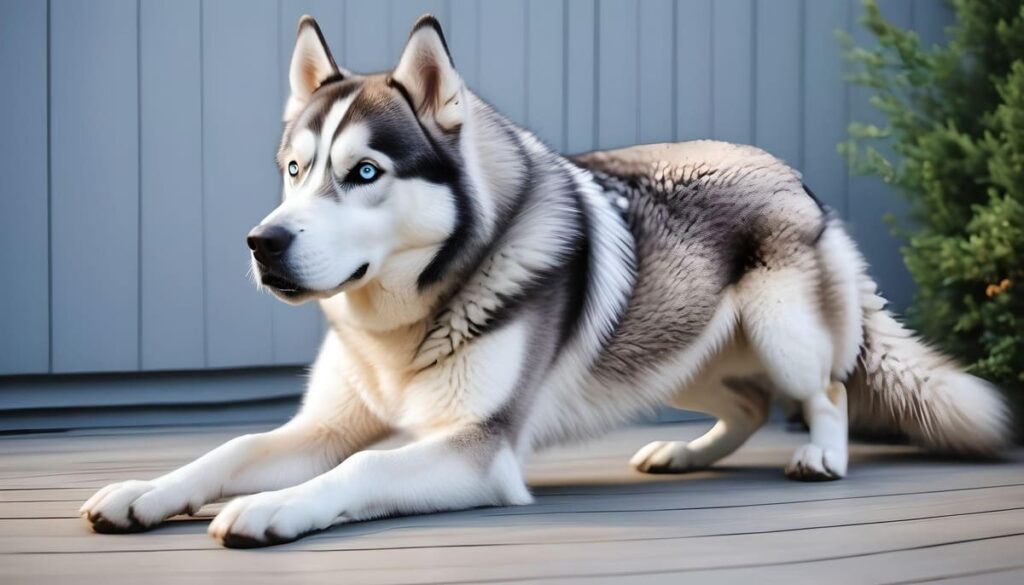
Health Issues of Husky Dogs
Huskies are generally known for their energetic and friendly nature. However, like all breeds, they can be prone to certain health issues. It’s important to note that not all huskies will experience these problems, and responsible breeding practices can help minimize the risk. Here are some common health issues associated with Husky dogs:
- Hip Dysplasia: This is a genetic condition where the hip joint doesn’t fit properly into the hip socket, leading to arthritis. It can cause discomfort and limping. Regular exercise, a balanced diet, and maintaining a healthy weight can help manage this condition.
- Eye Issues: Huskies are prone to certain eye conditions such as cataracts and progressive retinal atrophy (PRA). Regular eye check-ups are essential, and responsible breeding can help reduce the risk of hereditary eye problems.
- Skin Conditions: Some huskies may develop skin issues, including allergies and dermatitis. Maintaining proper hygiene, providing a balanced diet, and addressing any allergy triggers can help manage these problems.
- Gastrointestinal Issues: Huskies can be sensitive to certain foods, leading to digestive problems. Providing a high-quality, well-balanced diet and avoiding foods that trigger allergies or sensitivities is crucial.
- Hypothyroidism: This is a condition where the thyroid gland doesn’t produce enough hormones. Symptoms include weight gain, lethargy, and skin problems. Regular veterinary check-ups can help monitor and manage this condition.
- Inherited Conditions: Some hereditary conditions may affect huskies, including certain types of anemia and neurological disorders. Responsible breeding practices can help reduce the risk of passing these conditions to offspring.
- Ear Infections: Due to their fluffy ears, huskies may be more prone to ear infections. Regular cleaning and inspection of the ears can help prevent infections.
- Obesity: Huskies are an active breed and require regular exercise. Lack of physical activity and overfeeding can lead to obesity, which can contribute to various health problems. It’s important to provide them with adequate exercise and portion-controlled meals.
Husky Dog Lifespan
The average lifespan of a Husky dog is typically between 12 to 14 years. With proper care, a balanced diet, regular exercise, and routine veterinary check-ups, Huskies can lead healthy and active lives. Factors such as genetics, lifestyle, and preventive healthcare practices play significant roles in determining the overall lifespan and well-being of these energetic and resilient dogs.
Food for Husky Dogs
Common Food options for Husky Dogs:
| Nutrient Categories | Recommended Foods |
|---|---|
| 1. Protein Source: | – High-quality, lean animal proteins such as chicken, turkey, and fish. |
| – Plant-based proteins like lentils, peas, and beans can also be included. | |
| 2. Carbohydrates: | – Whole grains like brown rice, oats, and quinoa for sustained energy. |
| – Vegetables such as sweet potatoes, carrots, and broccoli. | |
| 3. Healthy Fats: | – Omega-3 fatty acids from sources like salmon, flaxseed, and chia seeds. |
| – Moderate amounts of healthy oils like olive or coconut oil. | |
| 4. Vitamins and Minerals: | – Fruits such as blueberries, apples, and bananas for essential vitamins and antioxidants. |
| – Supplements as advised by a veterinarian, considering individual dietary needs. |
Names for Husky Dogs
Popular Names for Husky Dogs:
| Traditional Names | Modern and Unique Names |
|---|---|
| – Kodiak | – Kairo |
| – Nala | – Zephyr |
| – Yukon | – Luna |
| – Sasha | – Koda |
| – Tundra | – Nova |
| – Balto | – Aero |
| – Aurora | – Loki |
| – Nikita | – Everest |
| – Blaze | – Sable |
| – Kenai | – Nyx |
| – Maya | – Atlas |
| – Shadow | – Freya |
| – Thor | – Ember |
Husky Dog Care, Training and Grooming Video
Conclusion:
In short, Huskies are remarkable dogs known for their striking appearance, friendly demeanor, and energetic nature. This conversation has covered diverse aspects, from their history and characteristics to health considerations and care tips. It serves as a valuable guide for prospective owners, offering insights into Husky dogs’ unique traits and providing information on their well-being, making it easier to nurture a fulfilling and enduring companionship.
Frequently Asked Questions on Husky Dogs:
-
How much does a Husky puppy cost?
The cost of a Husky puppy can vary based on factors like breeder reputation, lineage, and location. On average, prices range from $600 to $1,500.
-
What is the lifespan of a Husky?
Huskies typically have a lifespan of 12 to 14 years when provided with proper care, nutrition, and regular veterinary check-ups.
-
Are Huskies good with children?
Yes, Huskies are generally good with children. They are known for their friendly and sociable nature, making them suitable family pets when properly trained and socialized.
-
Do Huskies shed a lot?
Yes, Huskies shed heavily, especially during seasonal changes. Regular grooming, including brushing their double coat, helps manage shedding.
-
How much exercise do Huskies need?
Huskies are highly energetic dogs that require at least 60 minutes of exercise daily. They thrive on activities like walks, runs, and playtime.
-
Can Huskies live in warm climates?
While Huskies are adapted to cold climates, they can live in warmer regions with proper care. Ensure they have shade, water, and avoid strenuous exercise in high temperatures.
-
Are Huskies easy to train?
Huskies are intelligent but can be independent and stubborn. Consistent, positive reinforcement-based training from an early age is essential for success.
-
Do Huskies get along with other pets?
With proper socialization, Huskies can get along well with other pets. However, their strong prey drive may make them prone to chasing smaller animals.
-
How often should I groom my Husky?
Regular grooming is crucial, especially during shedding seasons. Brush your Husky’s coat at least two to three times a week, and bathe them as needed.
-
Can Huskies be left alone for long periods?
Huskies may experience separation anxiety if left alone for extended periods. They thrive on companionship and do best in households where they are not left alone for long.
-
Do Huskies bark or howl?
Huskies are known for howling instead of traditional barking. They use various vocalizations to communicate needs, emotions, and alert their owners.
-
Are Huskies good guard dogs?
Huskies are generally not considered good guard dogs as they are friendly and sociable. They may not exhibit protective behaviors commonly associated with guard dogs.
-
What health issues are common in Huskies?
Common health issues in Huskies include hip dysplasia, eye conditions, hypothyroidism, skin conditions, and gastric issues. Regular veterinary check-ups are crucial for early detection.
-
Are Huskies prone to obesity?
Huskies can gain weight if not provided with enough exercise. Maintaining a balanced diet and ensuring regular physical activity helps prevent obesity.
-
Can Huskies be trained off-leash?
Due to their independent nature and strong prey drive, training a Husky to be consistently reliable off-leash can be challenging. It’s advisable to use a secure leash or harness during outdoor activities.
Recommended –

